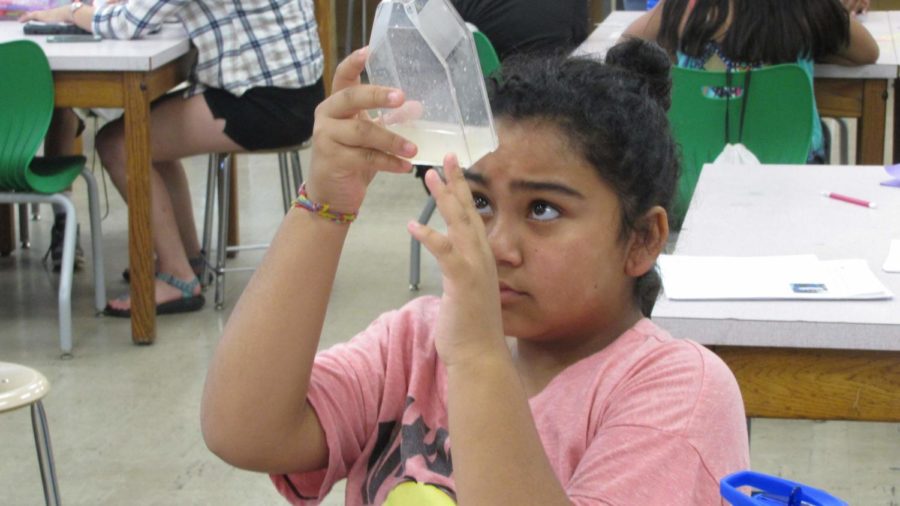Urban Ecosystems project furthers science education
Photo Courtesy of Jayde Gartner
Using a clear flask, a student observes and counts the amount of larva growing as a part of a mosquito nutrition experiment.
October 8, 2018
Faculty in Iowa State’s College of Human Sciences are doing more to create hands on experiences for their students through the Urban Ecosystems project.
This project was created in 2015 by Katherine Richardson Bruna, Iowa State University’s multicultural teaching educator, and Lyric Bartholomay, University of Wisconsin-Madison’s entomologist, to give undergraduate students studying elementary education an opportunity to better the science education of underserved youth in Des Moines.
Bruna said there are three goals for this project. The first is to “empower these socioeconomically stressed kids. Many of them feel that they could be a scientific resource for their teachers and students, which is super affirming.”
Bruna said the second goal of the program is to help prepare future elementary educators to teach science.
“The elementary education program does not teach enough science and we want to prepare our students by enhancing science education for these kids,” Bruna said.
The third goal is to teach members of the community accurate information about mosquitoes, according to the College of Human Sciences.
Bruna stressed the importance of awareness in urban settings, as public outreach often fails to serve them.
“We give students the knowledge and skills for this public outreach,” Bruna said. “The aim is to elevate educational opportunity and advancement in communities that have been left behind by the educational system.”
Jayde Gartner, senior in elementary education, was one of these students last year, and her hard work and enthusiasm drove her to work more closely with Bruna as an undergraduate research assistant. Gartner even earned a paid position working with students in the three week “Mosquitoes and Me” summer camp.
“This is everything I wanted to do with my teaching degree,” Gartner said.
Despite her distaste for mosquitoes, her passion for the project matches Bruna’s.
“I’m dedicated to understanding my personal issues so as not to hinder students’ growth,” Gartner said.
Bruna said she suspects that the project gained so much traction over the past four years because of children’s genuine curiosity about the natural world.
“We want to capitalize on that wonder and allow these students to acquire experience using authentic science tools to help answer questions.” Bruna said. “Every question is considered valid and anything that can help answer these questions is considered a science tool, even a conversation. Students feel seen.”
The elementary students are not the only ones reaping benefits from this program.
Gartner was audibly emotional as she recalled an instance in which a student in the program confidently shared her data with a professional entomologist.
“The Urban Ecosystems Project is my heart and soul,” Gartner said. “Working so closely with Dr. Bruna and the youth has been such an amazing experience.”
















